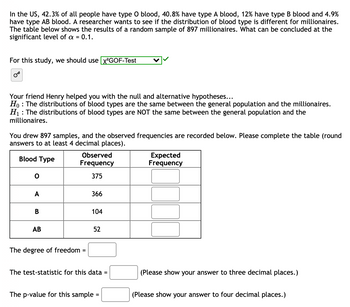
MATLAB: An Introduction with Applications
6th Edition
ISBN: 9781119256830
Author: Amos Gilat
Publisher: John Wiley & Sons Inc
expand_more
expand_more
format_list_bulleted
Question
thumb_up100%

Transcribed Image Text:In the US, 42.3% of all people have type O blood, 40.8% have type A blood, 12% have type B blood and 4.9%
have type AB blood. A researcher wants to see if the distribution of blood type is different for millionaires.
The table below shows the results of a random sample of 897 millionaires. What can be concluded at the
significant level of a = 0.1.
For this study, we should use [x²GOF-Test
Your friend Henry helped you with the null and alternative hypotheses...
Ho: The distributions of blood types are the same between the general population and the millionaires.
H₁: The distributions of blood types are NOT the same between the general population and the
millionaires.
You drew 897 samples, and the observed frequencies are recorded below. Please complete the table (round
answers to at least 4 decimal places).
Blood Type
0
A
B
AB
Observed
Frequency
375
The degree of freedom =
366
104
52
The test-statistic for this data =
The p-value for this sample=
Expected
Frequency
(Please show your answer to three decimal places.)
(Please show your answer to four decimal places.)
Expert Solution
This question has been solved!
Explore an expertly crafted, step-by-step solution for a thorough understanding of key concepts.
Step by stepSolved in 4 steps with 2 images

Knowledge Booster
Similar questions
- A researcher gathered a sample of participants who volunteered for a studying of phobias. She measured anxiety level of participants as they viewed photos of spiders and again when they viewed puppies. Which statistical test is appropriate for this study and why?arrow_forwardPlease help me with the following sections: d, e, f, g, h and i Thank you!arrow_forwardPart 1 of 4 A doctor in Oklahoma City wants to know whether the average life span for heart disease patients at four hospitals in the city differ. The data below represents the life span, in years, of heart disease patients from each hospital. Perform an ANOVA test with a 10% level of significance to test whether the average life span of heart disease patients in Oklahoma City differs depending on the hospital that treats them Life Span of Patients Treated at Hospital 1: 8.1, 1.2, 7, 11.5, 21, 2, 15.3, 19.2, 10.5, 15.4, 12.7, 15.3, 12.1, 7.5, 11.4, 16.4, 26.7, 14.6, 1.5, 16.3, 12.6, 0.8, 18.2, 4.2, 9.6, 21, 16.3, 2.7 Life Span of Patients Treated at Hospital 2: 17.6, 11.6, 16.8, 5.2, 6.7, 3.2, 13.8, 12.5, 0.9, 6, 14.3, 1.8, 14.8, 10, 5.8, 15.2, 10, 3.7, 11.4, 21.6, 12.9, 0.5, 9.2, 13.9, 10.9 Life Span of Patients Treated at Hospital 3: 8.5, 2.3, 11, 7.4, 14.8, 5.8, 11, 3.4, 10.9, 1.1, 5.9, 21.6, 12.5, 0.1, 15.5, 15.4, 0.8, 7.7, 5.6, 12, 7.1 Life Span of Patients Treated at Hospital 4:…arrow_forward
arrow_back_ios
arrow_forward_ios
Recommended textbooks for you
 MATLAB: An Introduction with ApplicationsStatisticsISBN:9781119256830Author:Amos GilatPublisher:John Wiley & Sons Inc
MATLAB: An Introduction with ApplicationsStatisticsISBN:9781119256830Author:Amos GilatPublisher:John Wiley & Sons Inc Probability and Statistics for Engineering and th...StatisticsISBN:9781305251809Author:Jay L. DevorePublisher:Cengage Learning
Probability and Statistics for Engineering and th...StatisticsISBN:9781305251809Author:Jay L. DevorePublisher:Cengage Learning Statistics for The Behavioral Sciences (MindTap C...StatisticsISBN:9781305504912Author:Frederick J Gravetter, Larry B. WallnauPublisher:Cengage Learning
Statistics for The Behavioral Sciences (MindTap C...StatisticsISBN:9781305504912Author:Frederick J Gravetter, Larry B. WallnauPublisher:Cengage Learning Elementary Statistics: Picturing the World (7th E...StatisticsISBN:9780134683416Author:Ron Larson, Betsy FarberPublisher:PEARSON
Elementary Statistics: Picturing the World (7th E...StatisticsISBN:9780134683416Author:Ron Larson, Betsy FarberPublisher:PEARSON The Basic Practice of StatisticsStatisticsISBN:9781319042578Author:David S. Moore, William I. Notz, Michael A. FlignerPublisher:W. H. Freeman
The Basic Practice of StatisticsStatisticsISBN:9781319042578Author:David S. Moore, William I. Notz, Michael A. FlignerPublisher:W. H. Freeman Introduction to the Practice of StatisticsStatisticsISBN:9781319013387Author:David S. Moore, George P. McCabe, Bruce A. CraigPublisher:W. H. Freeman
Introduction to the Practice of StatisticsStatisticsISBN:9781319013387Author:David S. Moore, George P. McCabe, Bruce A. CraigPublisher:W. H. Freeman

MATLAB: An Introduction with Applications
Statistics
ISBN:9781119256830
Author:Amos Gilat
Publisher:John Wiley & Sons Inc

Probability and Statistics for Engineering and th...
Statistics
ISBN:9781305251809
Author:Jay L. Devore
Publisher:Cengage Learning

Statistics for The Behavioral Sciences (MindTap C...
Statistics
ISBN:9781305504912
Author:Frederick J Gravetter, Larry B. Wallnau
Publisher:Cengage Learning

Elementary Statistics: Picturing the World (7th E...
Statistics
ISBN:9780134683416
Author:Ron Larson, Betsy Farber
Publisher:PEARSON

The Basic Practice of Statistics
Statistics
ISBN:9781319042578
Author:David S. Moore, William I. Notz, Michael A. Fligner
Publisher:W. H. Freeman

Introduction to the Practice of Statistics
Statistics
ISBN:9781319013387
Author:David S. Moore, George P. McCabe, Bruce A. Craig
Publisher:W. H. Freeman